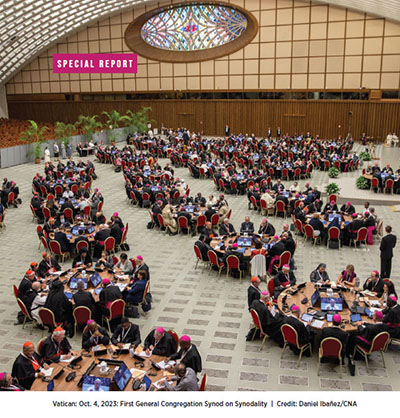
The Synod on Synodality: a progress report
By Faith Catholic and Faith Erie staff
01/25/2024
The first international session of the much discussed and highly anticipated 16th Ordinary General Assembly of the Synod of Bishops took place in Rome this past October. The meeting was organized around the theme, For a Synodal Church: Communion, Participation, Mission, an effort first proposed by Pope Francis in October 2021.
At the end of the three-week session, on Oct. 28, 2023, the members of the general assembly adopted the 41-page synthesis report, A Synodal Church in Mission, by a two-thirds majority. The new synod format had 365 delegates (344 voting members), including bishops, laypeople and consecrated men and women, all of whom were seated at round tables to facilitate discussion of synod priorities. Additional commentary from dioceses around the world will be taken into account during the next stage of the synod — another Vatican assembly in October 2024 —with the goal of furthering the mission of the church to go forth and preach the Gospel, united as one body of Christ.
What happened in October?
Although the Vatican and bishops around the world made it clear the gathering would be a first step, that has become even more evident since the meeting took place.
The church has been holding synods since ancient times. The term “synodality,” however, is new. It means the entire People of God assembling together, journeying together, and actively participating in the evangelizing mission of the church. While the Catholic Church has recognized that more voices need to be at the table, Americans, in particular, need to understand that synodality does not equal democracy. According to the International Theological Commission, “The principle of synodality is the action of the Spirit in the communion of the Body of Christ and in the missionary journey of the People of God.”
Pope Francis is calling us to recognize synodality as the way the entire church operates. Everyone should be involved, everyone should contribute. In particular, it means listening to each other and not remaining oblivious in our own bubbles. It should be a collaborative effort that benefits from everyone’s gifts, without turning lay people into clergy or clergy into lay people.
It starts with you
While synodality, especially on a global level, may feel like a long and even cumbersome process, consider that within the span of a single year, every diocese in the world was invited to submit its thinking in response to the same series of questions. During that time, reports were prayerfully written and submitted at the diocesan, regional, national and continental levels.
At a national Zoom held for diocesan leaders in early January 2024, team members of the U.S. bishops’ synod process reminded participants that synodality is not just happening in Rome; that it must be evident in our lives, our homes, our churches and our dioceses. And that we need to help people understand it on a tangible level.
“Start small,” said Bishop Daniel Flores of the Diocese of Brownsville, Texas, who coordinates the national team, suggesting that it starts with the individual. “Make a sandwich for someone who is hungry.” He also encouraged people to work with their pastors. But don’t go tell your pastor what he needs to do, Bishop Flores said, instead recommending that ideas be presented as something “we” need to do together.
What happens next in the Diocese of Erie?
The October 2023 meeting helped clarify that the Spirit is calling the church to deepen and broaden its understanding of synodality. Yes, worldwide conversations brought forth a plethora of concerns. But the Vatican wants to look beyond agendas and topics and ideologies to first focus on creating a strong foundation for moving forward.
To that end, the Vatican’s Secretariat for the Synod of Bishops has asked dioceses across the world to hold additional listening sessions in February and March of 2024. As coordinator of the US bishops’ synod process, Bishop Flores has asked each American diocese to hold two or three listening sessions to consider the guiding questions posed by the synod secretariat. The broad questions, which will be tailored to different themes, are:
• Where have I seen or experienced successes— and distresses — within the church’sstructure(s)/organization/leadership/life thatencourage or hinder the mission?”
• How can the structures and organization ofthe church help all the baptized to respond tothe call to proclaim the Gospel and to live as acommunity of love and mercy in Christ?
The USCCB also will hold listening sessions at the national level with a focus on participation, social justice and vocations.
As Faith magazine went to print, plans were being put into place to reach out to the men and women who facilitated the original 45 sessions held in the Diocese of Erie, to determine how dialogue on these new questions might occur. In addition, Bishop Lawrence Persico will be involved with sessions including voices that had smaller participation in the first round: African American Catholics, college students and clergy. (Many clergy did not participate in their parish sessions in the hope that lay members would feel free to speak openly.)
A report from these sessions will be submitted to the USCCB by April 8. At that point, dioceses are being asked to have theologians and canonists review and weigh in on the responses, helping the Vatican prepare for its next international gathering set for October 2024.
Where can I find the report?
Click here for the 41-page document.
Pray for the Synod
As the church continues to learn and discern more about living synodality, every Catholic is invited to commit to prayer. Visit the Vatican’s website dedicated to this call at www.prayforthesynod.va/en/ to find an array of prayers, including special intentions for each month. They can be offered as individuals, as families, in small groups or by parishes.
-
